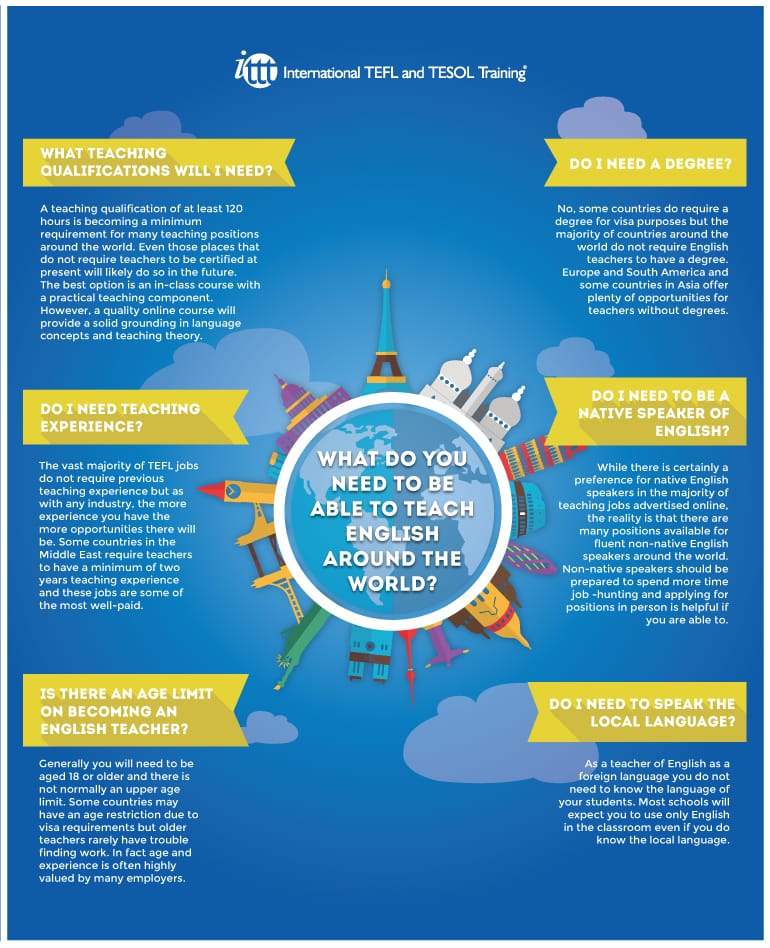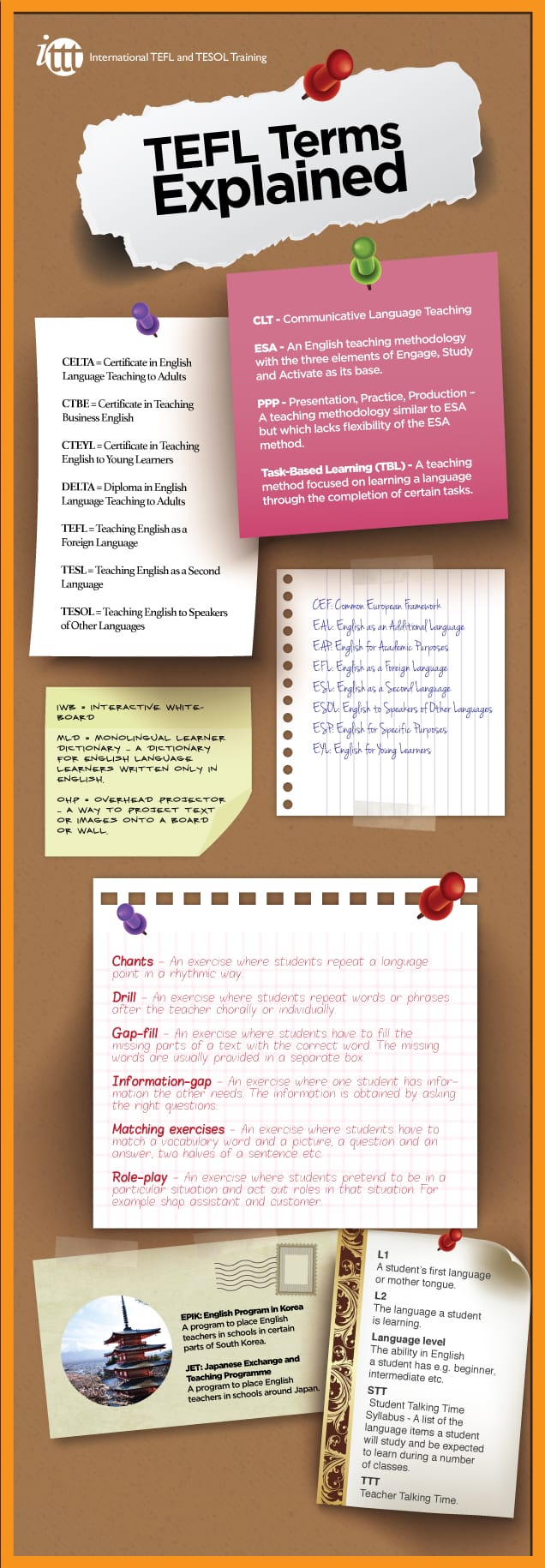MEANING OF TESOL
Meaning of TESOL | What does TESOL mean?
The term TESOL is one that is often used in a general sense, although it does have a specific meaning. Generally the meaning of TESOL is some form of ‘the Teaching of English to people whose first language is not English’ and is often used interchangeably with terms such as TEFL, TEAL, TESL and many others. It is also generally used as the name of a qualification, such as a TESOL certificate, which relates to the result of a TESOL training course.
Here we will look at the meaning of TESOL in these broad terms and also give its specific meaning, along with many other common acronyms used throughout the industry.
The general acronym for the field of teaching English is ELT: English language teaching. This term applies across the board to teaching English, be it to American high school students in the USA, Australian kindergarteners in Australia, immigrants from Pakistan to the UK or Thai adults learning English in their home country.
ITTT trains people in the teaching of English to students learning English as a foreign/second/additional language. As a starting point, have a look at the following infographic, which is a good introduction to the meaning of TESOL:

As the graphic indicates, the teaching of English takes place in various countries around the world and this gives us our first two acronyms.
Teaching English to Speakers of Other Languages
This term describes the first and second situations as in both cases the learners’ first language is not English. Where it is taught is not important.
TESOL is a general term that is often used to encompass the two terms below, but in practice all three have much the same meaning and are generally interchangeable.
Teaching English as a Foreign Language.
This is used when the English teaching to non native speakers takes place in a country where the first language is not English. Examples would be teaching English in Mexico or teaching English in Thailand.
Teaching English as a Second Language
TESL applies when teaching English to non native speakers in a country where English is the first language. ESL is also regarded as a synonym for TEFL by some people within the industry. Examples would be teaching English to Italians in England or teaching non-native English-speaking immigrants English, in Australia. It would also be applicable in an international school setting where students are in an English-speaking environment,
There is another variant on the theme:
Teaching English as an Additional Language
TEAL takes account of the fact that many English language learners already have more than one language ability. For example, an immigrant to the UK from Malaysia may already speak Malay and a Chinese dialect fluently. English for this person would therefore not be a ‘second’ language as such.
Variations on the terms above are used too:
English as a Foreign Language
English as a Second Language
English to Speakers of Other Languages
English as an Additional Language
There are a few other terms that are used for aspects of teaching English to non-native speakers:
English language learner
In the TEFL world, this is usually applied to anyone learning English in addition to their native language, though it could apply to anyone learning English.
English for Specific Purposes
ESP is a learner-centered approach to teaching English as an additional language, which focuses on developing English communication in a discipline such as academics, accounting, medicine, business, IT, teaching, engineering, etc.
English for Academic Purposes
Usually used for ELLs in academic settings, such as learning English at a university while being taught in English. This is technically a sub-branch of ESP.
English for Occupational Purposes
This is another sub-branch of ESP, where English is learned with a definite focus on a particular profession, such as law, medicine, banking, etc.
Teaching Business English
TBE is more generic than EOP as the subject matter doesn’t necessarily focus on a particular profession or industry
Teaching English to Young Learners
Within the TEFL industry young learners are generally regarded as between the ages of 18 months and 13 years.
Teaching English Online
This refers to any TEFL class taught online (via Zoom, Skype or any online platform) rather than in person in a classroom setting.
You will come across many more acronyms in the TESOL teaching world, so here are a few of the most commonly used ones:

Register now & get certified to teach english abroad!
The meaning of TESOL Courses: Their purpose and the meaning of TESOL qualifications
There are three general routes to achieving a TESOL certification. These are in-class TESOL courses, online TESOL courses or a mixture of both. Some of the general features of each type are:
ITTT in-class courses features:
- ITTT has over 30 locations worldwide where teaching demand is high.
- TESOL certification is for 120-hours, typically taken over four weeks.
- All have genuine teaching practice opportunities with real English language learners.
- On completion of your course you are well placed for local teaching jobs.
- All ITTT in-class TESOL courses are internationally accredited.
You can find details of the ITTT centers using the interactive map below.
For a description of what your course would involve see the graphic below.

Online courses features
A popular meaning of TESOL courses is online courses, with a number of options from ITTT. All ITTT online courses are internationally accredited and come with tutor support.
- They may be taken from anywhere in the world where you have a device for using the operating system and an internet connection.
- There are a large selection of options for gaining an ITTT TESOL certificate.
- online TESOL courses can be completed in a shorter timeframe than onsite or in-class courses.
The ITTT online TESOL course options include:
- 120-hour TESOL Course
- 170-hour TESOL Certification Course with Online Specialization
- 220-hour Master Package Course
- 250-hour Diploma in TESOL Course
- 550-hour Expert Package Course
- 60-hour Specialized Course in Teaching English Online
- 60-hour Specialized Course in Teaching English to Young Learners
- 60-hour Specialized Course in Teaching Business English
Combined courses features
- Offer the benefits of online and in-class courses.
- Are cheaper overall than in-class.
- Have fewer locations worldwide available.
The ITTT Combined course is offered at the following locations.
- Bangkok, Thailand
- Barcelona, Spain
- New York City, USA
- Paris, France
- Phuket, Thailand
- Rome, Italy

Using your TESOL certificate to teach English
To find more information about teaching opportunities ITTT has compiled a country-by-country guide to the meaning of TESOL and living and teaching English in many countries around the world. The guides are a good introduction to life in each country, plus an insight into their customs and curiosities.
More information here
To give you an idea of the types of salary and living costs while teaching English overseas, have a look at our infographic below.

The Recruitment Process
TESOL job searching methods vary from country to country and for the type of job you are looking for. In many countries such as Japan, South Korea, Taiwan, Saudi Arabia, and the U.A.E., it is possible for teachers to find a job via online job posts or a recruitment company. Often the application process is done by email and interviews are conducted through webcam or telephone. Many employers in much of Europe, Latin America and some parts of Southeast Asia, prefer to have in-person interviews with their candidates. If this is the case then, teachers will need to head to their country of choice first and then apply directly to schools in the local area.

Your future employer may want you to explain the meaning of TESOL. For some useful information about interviews have a look at this infographic:

Lifestyle of a TESOL teacher
For more on the meaning of TESOL and TESOL teacher lifestyles you might want to review this infographic:

Why Choose ITTT?
- ITTT are affiliated to and accredited by some of the leading individuals, institutes and schools in the language teaching field.
- Our in-class TESOL course offers a wide choice of locations around the world ensuring there is an option to suit everyone.
- Our online TESOL courses offer the utmost convenience as they can be studied from any location at the pace of your choosing.
- Whichever course you choose you can rest assured that you will receive the same high-level of study materials, tuition and support.
- Every graduate will have access to our post-course job support services for as long as they continue teaching EFL.
- Our TEFL courses are open to anyone over the age of 18 who has a good standard of English language comprehension, regardless of their educational background.
- ITTT will attempt to address the meaning of TESOL and prepare you to teach English in the location of your choice.



